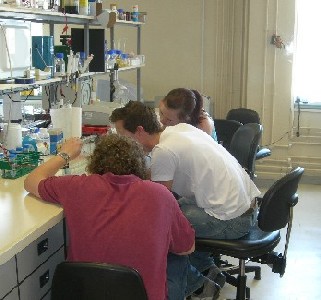The spring research school
For the last 2 years, my team has experimented with a personal trainee scheme where students are given the opportunity to experience a true research environment and to prepare for the 3rd year project. It is the performance in research projects that mostly influences successful future employment, and students generally underestimate its importance to their career when they choose their projects. They often find it hard to adapt to a hectic year 3 which involves full time work in the lab from 9.00 a.m. to 5.00 p.m. with the lectures in between and plenty of in-course assessment deadlines throughout the term. We also find that standard practical classes in years 1 & 2 do not prepare students well enough for the real dissertation work in year 3, neither do they offer a realistic insight into scientific work.
 To simulate a third year project, students with a strong continuous assessment record are short listed for the trainee scheme and specifically invited to submit an application. Based on those, several candidates are invited for an interview and 1-2 students are offered a trainee position. This involves a 6 week period (that may or may not involve time during the Easter holidays) in which students work in the lab from 9.00 a.m. to 5.00 p.m. and only leave the lab for lectures and practicals, exactly as expected for the third year project in year 3 (except that then it will be 10 weeks).
To simulate a third year project, students with a strong continuous assessment record are short listed for the trainee scheme and specifically invited to submit an application. Based on those, several candidates are invited for an interview and 1-2 students are offered a trainee position. This involves a 6 week period (that may or may not involve time during the Easter holidays) in which students work in the lab from 9.00 a.m. to 5.00 p.m. and only leave the lab for lectures and practicals, exactly as expected for the third year project in year 3 (except that then it will be 10 weeks).
During their training period, students will be working on real research projects and are fully integrated into the research team. They will work together with post-docs or graduate students and receive 1to1 tuition. The aim is to carry out proper experiments and to repeat difficult steps until they are fully mastered. Specific training will involve preparation of standard solutions and media, extraction of nucleic acid and proteins from biological samples, gel electrophoresis, tissue culture and sterile work, an introduction to confocal laser scanning microscopy, maintaining a proper laboratory notebook and learning how to present scientific results in an oral presentation at the end of the placement.
Upon completion of the training period, a personal reference will be provided that may be useful for future applications (i.e. other summer jobs, third year projects, PhD studentships, Masters courses….). Depending on their performance, trainees may be offered temporary employment in the host laboratory during the summer, and may be offered a bursary to present their data at an international conference.
To read a testimony of a past trainee click here